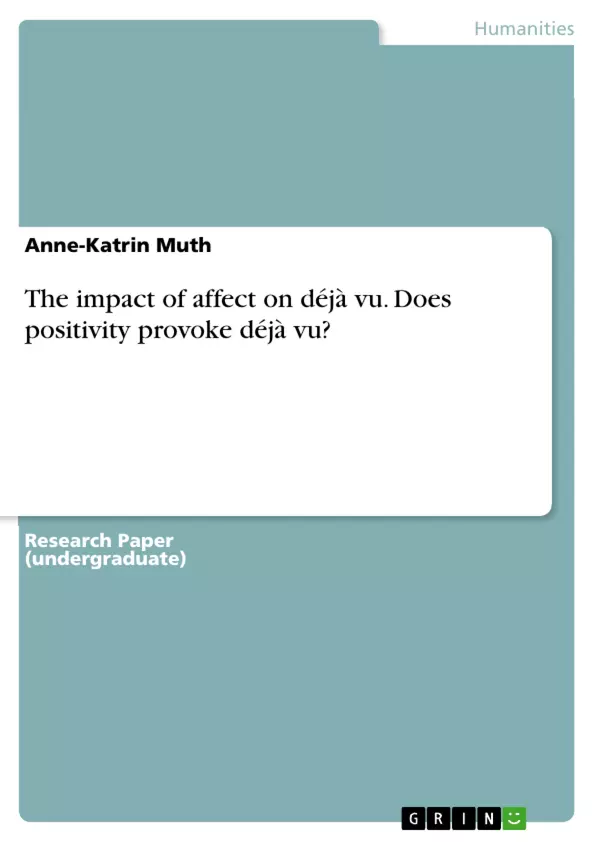This study sought to find out whether the effect of positive mood on familiarity also transfers to déjà vu. It was hypothesized that people with a higher positive affect will be more likely to commit errors in a memory judgment task, and subsequently experience more déjà vus in a lab study. 42 participants of both sexes with a mean age of 23 participated for course credit or voluntarily. We used a 2 x 2 experimental research design with a mood induction (positive and neutral) and a computer task with pictorial stimuli; assignment to the mood conditions was random. The dependent variables were performance at a memory test and déjà vu occurrence. Independent variables were level of positive affect and processing style (deep or shallow). While we did not find that people with a higher positive affect were less accurate in the memory test, we found that more positive people were more likely to experience déjà vu. We concluded that the results of the present study could shed new light on previous studies but urge their replication with a larger sample size.
Inhaltsverzeichnis (Table of Contents)
- Abstract
- Déjà vu, that particular funny feeling
- Descriptive Studies and Longitudinal Studies
- Experiments in which déjà vu was successfully induced
- Perceptual Theories
- Implicit memory theories
- Familiarity hypothesis of déjà vu
- A novel finding we came across in our preliminary déjà vu study
- Affect-as-information hypothesis
Zielsetzung und Themenschwerpunkte (Objectives and Key Themes)
The study aims to investigate the relationship between positive mood and déjà vu experiences. The research seeks to determine whether individuals with higher positive affect are more likely to experience déjà vu. The study draws upon existing literature and experimental findings to explore the potential impact of affect on memory processes and the occurrence of déjà vu.
- The influence of positive affect on memory judgments and déjà vu experiences.
- Exploration of the familiarity hypothesis of déjà vu, focusing on the role of implicit memory and source monitoring.
- Examination of different theoretical explanations for déjà vu, including perceptual, implicit memory, and physiological theories.
- Analysis of the relationship between positive affect and déjà vu frequency.
- Application of the affect-as-information hypothesis to understand the impact of mood on memory encoding strategies.
Zusammenfassung der Kapitel (Chapter Summaries)
- The study outlines the phenomenon of déjà vu and its prevalence, citing previous research and highlighting the intriguing nature of this experience.
- The study discusses existing research on déjà vu, including descriptive studies, longitudinal studies, and experimental manipulations.
- The study examines two cognitive explanations for déjà vu: perceptual theories and implicit memory theories, exploring specific studies that support these explanations.
- The study presents a novel finding from the authors' own preliminary research, suggesting a correlation between positive affect and the frequency of déjà vu experiences.
- The study introduces the affect-as-information hypothesis and its implications for understanding the relationship between mood and memory encoding strategies.
Schlüsselwörter (Keywords)
This study focuses on the intriguing phenomenon of déjà vu, exploring its relationship with positive affect, memory judgment, and familiarity. Key terms and concepts include déjà vu, positive affect, memory encoding, familiarity hypothesis, implicit memory, perceptual theories, and the affect-as-information hypothesis. The research aims to shed light on the mechanisms underlying this intriguing experience and its potential links to mood states.
Frequently Asked Questions
Does positive mood provoke déjà vu?
The study found that individuals with a more positive affect were more likely to experience déjà vu, although they weren't necessarily less accurate in memory tests.
What is the "familiarity hypothesis" of déjà vu?
It suggests that déjà vu occurs when a current situation feels familiar due to implicit memory, but the actual source of that familiarity cannot be identified.
What is the "affect-as-information" hypothesis?
This hypothesis posits that people use their current mood as a source of information when making judgments, which can influence memory encoding strategies.
How was déjà vu induced in the lab study?
The researchers used a computer task with pictorial stimuli combined with mood induction (positive vs. neutral) to observe déjà vu occurrences.
What are the main cognitive theories for déjà vu?
The paper explores perceptual theories, implicit memory theories, and physiological explanations for the phenomenon.
- Citar trabajo
- Anne-Katrin Muth (Autor), 2011, The impact of affect on déjà vu. Does positivity provoke déjà vu?, Múnich, GRIN Verlag, https://www.grin.com/document/461278



